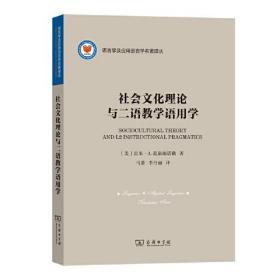
社会文化理论与二语教学语用学(英文版)/世界语言学与应用语言学研究丛书
全新正版 极速发货
¥ 46.5 7.5折 ¥ 61.9 全新
库存3件
浙江嘉兴
认证卖家担保交易快速发货售后保障
作者(美)雷米·范·康普诺利
出版社外语教研
ISBN9787521303254
出版时间2018-08
装帧其他
开本其他
定价61.9元
货号30272169
上书时间2025-01-07
- 最新上架
商品详情
- 品相描述:全新
- 商品描述
-
作者简介
雷米·范·康普诺利,卡内基梅隆大学现代语言学系副教授,主要教授与第二语言习得、法语研究等相关的课程,主要研究方向包括第二语言习得、教育学、语言测试、语用学和社会语言学,以及课堂话语与互动等。作者对于第二语言习得与语言教学有着深入的研究及独到的见解,已在各大靠前期刊上发表相关学术论文数篇。
目录
导读
Acknowledgments
Transcription Conventions
1 Introduction
Introducing Sociocultural Theory and Second Language Instructional Pragmatics
Sociocultural Theory as a Basis for Educational Praxis
Research Context and Data Sources
Overview of the Chapters
2 Appropriateness in Language Learning and Language Teaching
Introduction
Theoretical Foundations of Appropriateness
Pragmatics as Mediated Action: A Pedagogical Framework
Conclusion
3 Understanding Learners as People
Introduction
Education and the Development of Personalities
Internalization as Personalization
Emotion and Instructional Pragmatics
Conclusion
4 Developing Awareness of Pragmatic Knowledge Through Verbalized Reflections
Introduction
Language as a Psychological Tool
Monologic Verbalized Reflection
Dialogic Verbalized Reflection
Conclusion
5 Developing Pragmatic Knowledge Through Appropriateness Judgment Tasks
Introduction
Dynamic Assessment and Pragmatic Knowledge
Dynamically Administered Appropriateness Judgment Tasks as Transformative, Developmental Activity
Pre-enrichment and Post-enrichment Appropriateness Judgment Tasks
Conclusion
6 Developing Performance Abilities Through Strategic Interaction Scenarios
Introduction
Dynamic Assessment and Pragmatic Performance
Human Mediation and the Emergence of Controlled Performance
Orientation, Execution and Control
Conclusion
7 The Future of Vygotskian Approaches to Instructional Pragmatics
Introduction
Implications for Research
Implications for the Classroom
Implications for Teacher Education
Final Comments
References
内容摘要
雷米·范·康普诺利著的《社会文化理论与二语教学语用学(英文版)》旨在基于社会文化理论,构建二语教学语用学的实施框架,为展开语用教学提供参考。
全书共分为七章。第一章至第三章主要介绍研究背景、理论基础、研究设计等内容,建立社会文化理论与二语教学语用学的逻辑联系。第四章至第六章为全书的主体部分,分别讨论话语反思对二语语用意识发展的作用,得体性判断任务对二语语用知识发展的作用,策略性互动情节对二语语用运用能力发展的作用。第七章在总结和分析书中研究不足的基础上,指出本书对科研、教学和教师教育的启示意义,并为未来的研究指明方向。
本书在研究选题、理论基础、分析维度、实验设计、数据解读等方面均具有较大的创新性,代表着当今语用教学研究的最新发展动向,对二语教学语用学的发展具有重要示范和推动作用。
相关推荐
— 没有更多了 —






















以下为对购买帮助不大的评价